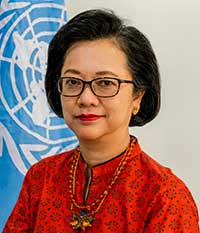Partnering with Persons with Disabilities Toward an Inclusive, Accessible and Sustainable Post-COVID-19 World
BANGKOK, Thailand, Dec 03 (IPS) - As the world observes the International Day of Persons with Disabilities today, we honour the leadership of persons with disabilities and their tireless efforts to build a more inclusive, accessible and sustainable world. At the same time, we resolve to work harder to ensure a society that is open and accommodating of all.

An estimated 690 million persons with disabilities, around 15 per cent of the total population, live in the Asia-Pacific region. Many of them continue to be excluded from socio-economic and political participation. Available data suggests that persons with disabilities are almost half as likely to be employed as persons without disabilities. They are also half as likely to have voted in an election and are underrepresented in government decision-making bodies. Just about 0.5 per cent of parliamentarians in the region are persons with disabilities. Women with disabilities are even less likely to be employed and hold only 0.1 per cent of national parliament positions.
One of the main reasons behind these exclusions is a lack of accessibility. Public transportation and the built environment in general -- including public offices, polling stations, workplaces, markets and other essential structures -- lack ramps, walkways and basic accessibility features. Accessibility, however, goes beyond the commonly thought of physical structures. Barriers to access to services and information and communication technology must also be removed, to allow for the participation of persons with diverse types of disabilities, including persons with intellectual disabilities and hearing and vision impairments.
The COVID-19 pandemic and related lockdowns has exacerbated existing inequalities. Many persons with disabilities face increased health concerns due to comorbidities and were left without access to their personal assistants and essential goods and services. As much of society moved online during lockdowns, inaccessible digital infrastructure meant persons with disabilities could not access public health information or online employment opportunities.
Despite these challenges, persons with disabilities and their organizations were among the first to respond to the immediate needs of their communities for food and supplies during lockdowns in addition to continuing their long-term work to support vulnerable groups.
ESCAP partnered with several of these organizations to support their work during the pandemic. Samarthyam, a civil society organization in India led by a woman with disabilities, has trained many men and women with disabilities to conduct accessibility audits in their home districts. With these skills, they are becoming leaders and advocates in their communities, working towards improving the accessibility of essential buildings everywhere.
Another ESCAP partner, the National Council for the Blind of Malaysia (NCBM), is working to improve digital accessibility by training a group with diverse disabilities in web access auditing, accessible e-publishing and strategic advocacy. NCBM hopes to support participants in forming a social enterprise for web auditing and accessible publishing, creating employment opportunities and enabling persons with disabilities to lead efforts to improve online accessibility.
Women and men with disabilities have been leaders and champions to break barriers to make a difference in Asia and the Pacific. Today, ESCAP launches the report “Disability at a Glance 2021: The Shaping of Disability-inclusive Employment in Asia and the Pacific.” The report highlights some innovative approaches to making employment more inclusive, as well as recommendations on how to further reduce employment gaps.
Adjusting to a post-COVID-19 world presents an opportunity for governments to reassess and implement policies to increase the inclusion of persons with disabilities in employment, decision making bodies and all aspects of society. Accessibility issues impact not only persons with disabilities but also other people in need of assistance, including older persons, pregnant women or those with injuries. Implementing policies with universal design, which creates environments and services that are useable by all people, benefits the whole of society. Governments should mainstream universal design principles into national development plans, not only in disability-specific laws and policies.
As a global leader in disability-inclusive development for over 30 years, the Asia-Pacific region has set an example by adopting the world’s first set of disability-specific development goals in the Incheon Strategy to “Make the Right Real.” Meeting the Incheon Strategy goals will require governments to intensify their efforts to reduce barriers to education, employment and political participation.
At ESCAP, we know that achieving an inclusive and sustainable post-COVID-19 world will only be possible with increased leadership and participation of persons with disabilities. To build back better -- and fairer -- we will continue to strengthen partnerships with all stakeholders so together we can “Make the Right Real” for all persons with disabilities.
Armida Salsiah Alisjahbana is Under-Secretary-General of the United Nations and Executive Secretary of ESCAP
Follow @IPSNewsUNBureau
Follow IPS News UN Bureau on Instagram
© Inter Press Service (2021) — All Rights Reserved. Original source: Inter Press Service
 Global Issues
Global Issues